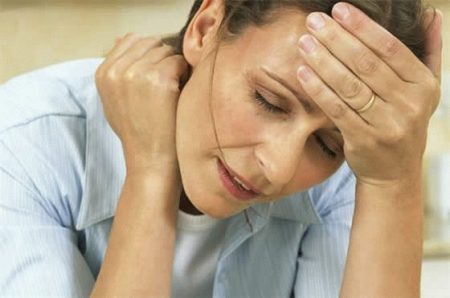The pain in his head – a sign of disturbance in the functioning of the cerebral circulation. This kind of pain often common in medical practice.
It is not only unpleasant consequence caused by the provocative external or internal factor, but also the possible symptom of the disease in the human body.
First, it is important to determine the causes of regular headaches, it will help you to choose how to deal with them.
Causes of headache
Have constant headaches, always has a cause that can be caused by:
- stressful situation;
- a lack of or excess of sleep;
- overexertion of the eye;
- hormonal imbalance;
- long medication;
- overweight;
- a head injury;
- alcohol;
- chronic fatigue.
A stressful situation
Although the minor stress is not harmful to the body, being in a constant state of stress, and stress leads to daily headaches and insomnia.

A lack or excess of sleep
Healthy sleep restores the physical and psychological state of the organism as a whole. Lack of sleep or, conversely, an excess of sleep can be pain in the head, which over time can become regular. For normal human functioning and lack of unpleasant consequences, you need to sleep during the day 6-7 hours.
Strain eyes
Prolonged paperwork or computer monitor, when properly selected glasses or not too bright lighting indoors is strain of the muscles of the eye that can provoke strong pain in the head.

Hormonal failure
Changing hormone levels can cause, why a headache every day. Such changes in hormonal background occur most frequently in women during the menstrual and premenstrual period, during menopause or menopause, and pregnancy.
Medication
Prolonged use of drugs can also cause daily headaches, for example, in the use of painkillers. It can also be a signal that some kind of medicine prescribed by your doctor is not right for you, and the daily headaches are just a side effect, which can be eliminated by replacing the drug analogue.
Overweight
If you have every day headache when overweight, it is a sign of the body of possible disease.
Trauma to the head
Headache in traumatic brain injury may last for 2-8 weeks. If seizures do not stop after, you should contact a doctor for chronic post-traumatic headache.
Alcohol
A certain dose of an alcoholic beverage or poor tolerance of alcohol can lead to discomfort.
Possible consequences
Regular headache is itself the consequence that may occur if you start the treatment of the disease, it can also be a signal of the body about the appearance of health problems. In addition, pain can develop into a serious disease – migraine, if not to take actions to get rid of the pain.

Effects daily headaches can also be:
- dizziness,
- nausea,
- lack of energy,
- vomiting,
- depression,
- insomnia,
- temperature, etc.
Headache is a possible symptom
Daily headaches differ in their power and frequency during the day, and can be a signal of the body about any disease. In addition, the headache may also be accompanied by other symptoms such as dizziness, nausea, blackouts, vomiting, etc.

The list of possible diseases with similar symptom:
- traumatic brain injury;
- hypertension;
- cancer;
- osteochondrosis in the cervical;
- meningitis;
- intoxication;
- glaucoma;
- diabetes;
- hormonal failure;
- atherosclerosis.
Do not forget that often the cause of headaches, occurring daily in humans can be fatigue, overexertion, etc.
Principal pain
- Stress, pressure drops, active mental work and stress often lead to the appearance of regular pain in his temples. This leads launched migraine and prolonged use of drugs, to which the body can build up a tolerance.
- If every day headache in the area of the back, it can be a sign of high blood pressure, diseases of the cervical spine (e.g. degenerative disc disease) or severe stress to this area and a sign of a neurological disorder.
- In the frontal part of the head pain can arise from a written work or long-term spent at the computer, while in a noisy or crowded place, because of visual overload. The pain in the forehead can also be a signal to a number of diseases, such as:
- neoplasms or vascular diseases of the brain,
- disease associated with the mental state,
- chronic intoxication (infectious or toxic), and others.
- The reason why pain can occur in the morning and even persist all day, is sleep deprivation or, conversely, too long a sleep. In the latter case (and in the day-dream every day) the pain occurs due to increase the flow of a special fluid – the cerebrospinal fluid that bathes the brain.
- If your problem now, nausea or dizziness in the first case it might be related to high or low blood pressure, obesity or intoxication.
In the second case, dizziness and fainting are added in severe injuries, cerebral edema, or if severe migraine attack. - Weakness in the fingers tingling of the hands and feet or numbness and feeling of heaviness in the area of the neck can be a sign of serious illness, such as:
- meningitis,
- infection of the tissues of the brain or spinal cord,
- arthritis, etc.
- The temperature is typically added when colds and infectious diseases, in meningitis and during the menstrual cycle.
- Throbbing pain is associated with:
- vascular diseases
- tumors
- when mastocytosis,
- the use of alcohol or stressful situations.
- Compression is a more common type of pain happens usually due to overexertion or too long, but can also be a symptom of a brain abscess, encephalitis and other diseases.
What to do for headaches
You first need to consult a doctor, if every day a headache for a long time, so self-medication is recommended only in the initial period.

Depending on the kind of pain and its power, the doctor will prescribe the necessary tests, which may include:
- General clinical analysis of blood;
- ultrasonic Doppler sonography (uzdg otherwise) of the vessels of the cervical and scalp;
- Cervical MRI, brain, and back;
- electroencephalography (aka EGG);
- lipidogramu;
- consultation by an ophthalmologist, psychologist or other professionals.
It is important to clarify the nature of the pain and identify the cause and then get rid of it. Pills (analgesics and analgesic) only temporarily reduce headache, so are not the solution to the problem.
To get rid of most aches and pains in the head usually as follows:
- taking a shower or a warm bath;
- a walk in the fresh air;
- massage of the head, the temples or the nape of the neck;
- physical warm-up the shoulders and neck;
- warm milk with a small amount of honey or hot tea with Valerian, lemon balm, motherwort and other herbs with a calming effect.
For more severe pain recommended:
- often a breathe of fresh air (walking and ventilate the room where you are);
- to avoid noise and sharp sounds;
- follow a strict sleep – sleep 6-7 hours per night;
- avoid odors and tastes;
- put a cold compress on the forehead;
- to use aromatherapy with lemon, lavender, rose and other oils;
- to include in the diet more vegetables and fruits;
- to avoid sudden changes in temperature;
- during cold to use a hat;
- to avoid stress and anxiety;
- use exercise with deep breathing, which is involved in the abdominal muscles;
- sleep doctors advise in a room with good ventilation and an average temperature;
- daily repeat eye exercises;
- to drink during the day plenty of fluids;
- relax the muscles of shoulders and neck using massage;
- it’s possible to take a vacation;
- as little as possible to turn on the TV or computer;
- planning holidays and working time.
Prevention of pain in the head
Preventive action is also important in getting rid of pain in the head, to avoid their re-return.

Some practical advice on how to avoid headaches:
- don’t slouch, don’t lean on the chairs, it makes the muscles of the neck, shoulders and scalp to tighten;
- not recommended for the chin to make the fulcrum (for example, pressed to his breast);
- when selecting pillows for sleeping focuses on comfort to the spine and cervical spine does not bend when you lie down;
- try not to run long and strong cough, which can head ache;
- it is not recommended to work at a computer monitor or reading a book, head bowed;
- not long tense facial muscles;
- observe the sleep mode;
- avoid stress and anxiety;
- take a relaxing bath or shower before going to bed;
- try to spend less time in front of the TV or computer.



